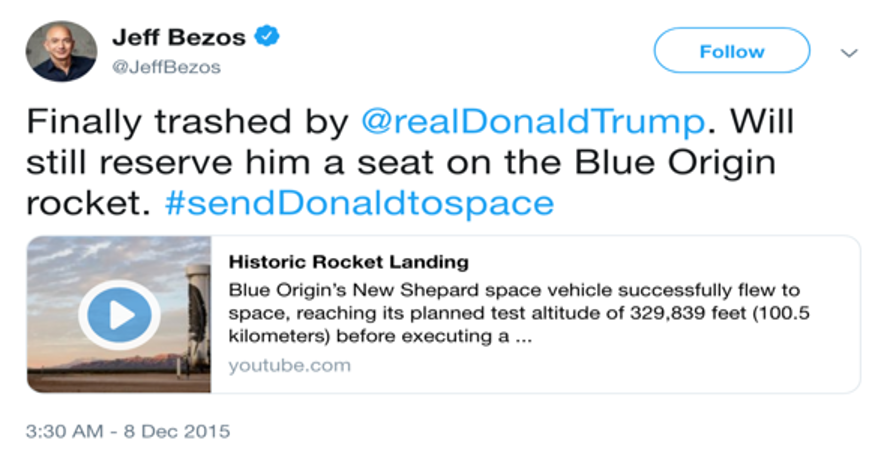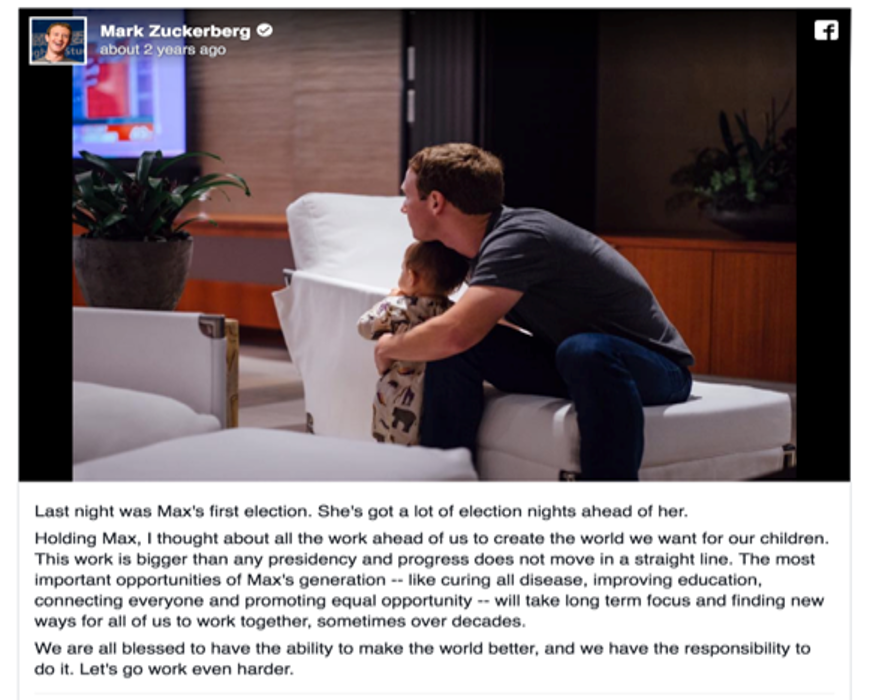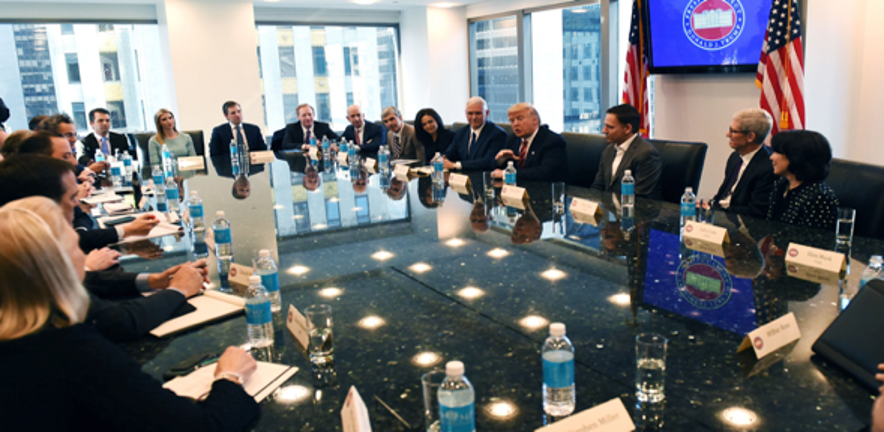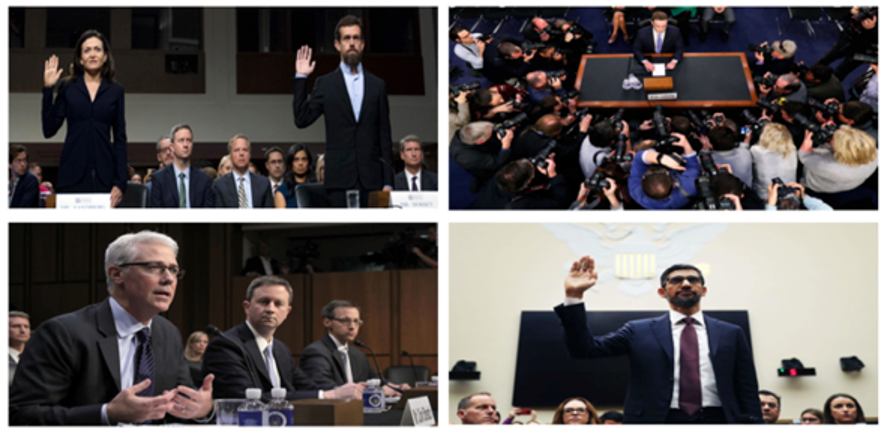1) From the time Trump first announced his run for the White House, most of Silicon Valley has been motioning through the five stages of grief: denial, anger, bargaining, depression, and finally, acceptance.
2) Denial (2015): No one took Trump’s presidential bid seriously and Silicon Valley liberals most of all, repulsed by his personal demeanor and polarizing remarks.
Trump& #39;s candidacy was treated as a joke. Jeff Bezos even offered to shoot Trump into space after a spat.
Trump& #39;s candidacy was treated as a joke. Jeff Bezos even offered to shoot Trump into space after a spat.
3) Anger (2016): Once it looked like Trump could win the GOP nomination nearly 150 angered Silicon Valley executives signed an open letter in opposition.
The vast majority of Big Tech money went to Hillary Clinton, conversely Trump used their tools to his advantage.
The vast majority of Big Tech money went to Hillary Clinton, conversely Trump used their tools to his advantage.
4) The reaction to Trump’s election win in Silicon Valley was beyond grim. It shook their belief that the Internet and their products always foster societal good.
5) Executives at Google consoled their employees in an all-staff meeting broadcast around the world.
Sergey Brin said he found the election “deeply offensive.”
Sergey Brin said he found the election “deeply offensive.”
7) Bargaining (2017): There was still hope for exerting influence and brokering a more amicable future so tech CEOs made a pilgrimage to Trump Tower for a high-profile meeting before he took office.
8) Some even joined Trump’s economic advisory board and business councils, despite their significant political differences. But the president went on with his controversial decisions on immigration and climate change.
9) After Trump’s discordant statement about the violence in Charlottesville a parade of CEOs walked away from their respective presidential councils. It was clear no bargain could be reached.
10) In an email to employees, IBM CEO Ginni Rometty wrote that though the company has worked with every president since Woodrow Wilson, recent events “run counter to our values as a country and a company.”
11) Depression (2018): First, news broke that Cambridge Analytica had illicitly harvested the personal data of millions of Facebook users for political purposes.
This intensified regulatory scrutiny of tech platforms and the public understanding of privacy and data protection.
This intensified regulatory scrutiny of tech platforms and the public understanding of privacy and data protection.
12) Trump accused Amazon of destroying jobs and evading taxes. The quest for Amazon’s second headquarters devolved into an elaborate charade and drew criticism.
Google and Twitter were rebuked for censoring conservatives to favor liberal politics.
Google and Twitter were rebuked for censoring conservatives to favor liberal politics.
13) The FTC said it wants to re-examine how the agency polices tech companies, including how antitrust law is enforced.
The European Union struck Google with an unprecedented $5 billion fine for antitrust violations.
The European Union struck Google with an unprecedented $5 billion fine for antitrust violations.
14) Tech CEOs were hauled in front of Congress for questioning. Facebook is “at war,” Mark Zuckerberg said to his employees.
15) 20,000 Google employees worldwide staged walkouts to protest sexual misconduct, gender inequality, and racism.
Silicon Valley was out of step with the social and economic anxieties roiling the nation.
Silicon Valley was out of step with the social and economic anxieties roiling the nation.
16) “They are the richest and most powerful people in the world and they’re always acting like they’re victims,” @karaswisher said.
“That’s exhausting from a group of people that have an ability to actively change the world.”
“That’s exhausting from a group of people that have an ability to actively change the world.”
17) Acceptance (2019): Silicon Valley started to improve its relationship with Washington. Tech CEOs moved from a reactionary mode to reconciliation.
18) As @profgalloway puts it, “The only thing in between Amazon and $1 trillion and $2 trillion in market cap is regulation.”
The tech industry’s focus shifted from fending off regulation to helping craft something palatable.
The tech industry’s focus shifted from fending off regulation to helping craft something palatable.
19) Trump extended a hand to Big Tech to prevent America losing its technological edge to China.
CEOs from Google, Microsoft, IBM (ahem!), Oracle and Qualcomm came to the White House with “bold ideas for how we can ensure American dominance” in industries of the future.
CEOs from Google, Microsoft, IBM (ahem!), Oracle and Qualcomm came to the White House with “bold ideas for how we can ensure American dominance” in industries of the future.
20) Sundar Pichai said that “we are proud to work together with government as we continue to invest in the US.”
Tech CEOs completed their grieving.
Tech CEOs completed their grieving.
21) Bezos, Cook, Pichai, and Zuckerberg have agreed to appear voluntarily before a congressional committee on July 29 as part of an investigation focused on antitrust.
22) Once again, it will serve as a reminder of the lack of cognitive ability and political will to reign in Big Tech’s power.
The hearings will be full of sound and fury, while signifying nothing legally. This is what regulatory capture looks like.
The hearings will be full of sound and fury, while signifying nothing legally. This is what regulatory capture looks like.
23) “Bad companies are destroyed by crisis, good companies survive them, great companies are improved by them,” wrote Intel visionary Andy Grove.
24) Big Tech have the resources to further solidify their dominance post-Covid.
As @benthompson notes, “The problems facing all of them are more challenging avenues for growth.”
As @benthompson notes, “The problems facing all of them are more challenging avenues for growth.”
25) The glory days for Big Tech will continue for a lot longer than we expect.
Locked in a tech arms race with China, look to increasing cooperation between Big Government and Big Tech in the time ahead.
Locked in a tech arms race with China, look to increasing cooperation between Big Government and Big Tech in the time ahead.

 Read on Twitter
Read on Twitter





